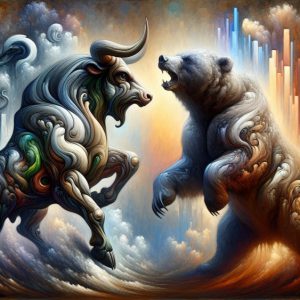
The Fallibility of Expert Opinions in Trading
Oct 3, 2024
When it comes to trading mistakes to avoid, one of the most crucial lessons is to recognize the limitations of expert opinions. Despite their credentials and experience, financial experts often fail to predict market movements or provide foolproof trading strategies accurately. This fallibility stems from the complex and often unpredictable nature of financial markets and the cognitive biases that affect even the most seasoned professionals.
As the ancient Chinese philosopher Lao Tzu (6th century BC) wisely observed, “Those who have knowledge don’t predict. Those who predict don’t have knowledge.” This timeless wisdom reminds us that even the most respected experts can fall prey to overconfidence and misinterpretation of market signals.
Overreliance on Technical Analysis: A Common Pitfall
Among the trading mistakes to avoid, overreliance on technical analysis ranks high. While technical analysis can provide valuable insights into market trends and potential entry or exit points, it should not be treated as an infallible predictor of future price movements. Many traders make the mistake of basing their decisions solely on technical indicators, ignoring fundamental factors that can significantly impact asset prices.
The renowned mathematician Benoit Mandelbrot cautioned against this approach, stating, “Financial markets are very complex, and it’s very hard to predict them with any accuracy.” This reminder underscores the importance of combining technical analysis with other forms of market research and risk management strategies.
The Impact of Mass Psychology on Trading Decisions
Understanding mass psychology is crucial when considering how to avoid trading mistakes. The collective behaviour of market participants can lead to irrational price movements and the formation of bubbles or crashes. Traders who fail to recognize the influence of mass psychology may find themselves caught up in market euphoria or panic, making poor decisions based on emotional rather than rational factors.
Gustave Le Bon, a prominent sociologist of the late 19th century, noted, “The masses have never thirsted after truth. They turn aside from evidence not to their taste, preferring to deify error if error seduces them.” This observation highlights the challenge of maintaining objectivity in the face of widespread market sentiment.
Cognitive Biases: Hidden Traps for Traders
Cognitive biases represent some of the most insidious trading mistakes to avoid. These mental shortcuts can lead traders to make irrational decisions based on flawed reasoning or emotional impulses. Common biases include confirmation bias, where traders seek out information that confirms their existing beliefs, and anchoring bias, where they rely too heavily on the first piece of information encountered when making decisions.
Daniel Kahneman, a Nobel laureate in economics, emphasized the impact of cognitive biases on decision-making, stating, “The illusion that we understand the past fosters overconfidence in our ability to predict the future.” Recognizing and mitigating these biases is essential for successful trading.
The Danger of Following the Herd
Herd mentality is another critical factor in the list of trading mistakes to avoid. The tendency to follow the actions of others rather than making independent decisions based on thorough analysis can lead to significant losses. This behaviour is often driven by the fear of missing out (FOMO) or the comfort of conformity.
An example of herd mentality’s destructive power can be seen in the dot-com bubble of the late 1990s. Investors, caught up in the excitement of new internet technologies, poured money into overvalued stocks, ignoring fundamental valuations. When the bubble burst, many suffered substantial losses.
Warren Buffett, one of the most successful investors of our time, famously advised, “Be fearful when others are greedy and greedy when others are fearful.” This contrarian approach encourages traders to think independently and avoid blindly following market trends.
Neglecting Risk Management: A Fatal Flaw
One of the most critical trading mistakes to avoid is neglecting risk management. Many traders, especially beginners, focus solely on potential profits without adequately considering the risks involved. This oversight can lead to outsized losses and even account blowouts.
The ancient Roman philosopher Seneca (4 BC – 65 AD) offered timeless wisdom on this matter, stating, “If one does not know to which port one is sailing, no wind is favorable.” In trading terms, this translates to the importance of having a clear risk management strategy before entering any position.
Overtrading: The Pitfall of Excessive Activity
Overtrading is a common mistake that can erode profits and increase transaction costs. Many traders fall into the trap of believing that more trades equate to more profits. However, excessive trading often leads to poor decision-making and increased exposure to market volatility.
Jesse Livermore, a legendary trader from the early 20th century, famously said, “It was never my thinking that made the big money for me. It always was my sitting.” This insight emphasizes the value of patience and selective trading over constant activity.
Ignoring Market Fundamentals
While technical analysis and market sentiment play important roles in trading, ignoring fundamental factors is one of the crucial trading mistakes to avoid. Economic indicators, company financials, and geopolitical events can significantly impact asset prices. Traders who focus solely on charts and indicators without considering these fundamental factors risk being blindsided by major market moves.
Benjamin Graham, known as the father of value investing, emphasized the importance of fundamental analysis, stating, “In the short run, the market is a voting machine but in the long run, it is a weighing machine.” This principle underscores the need for a balanced approach that considers technical and fundamental factors.
Emotional Trading: The Enemy of Rationality
Emotional trading is perhaps one of the most destructive trading mistakes to avoid. Fear, greed, and other strong emotions can cloud judgment and lead to impulsive decisions. Successful traders understand the importance of maintaining emotional discipline and sticking to their trading plans, even in the face of market volatility.
The Stoic philosopher Epictetus (55-135 AD) offered valuable wisdom on emotional control, stating, “It’s not what happens to you, but how you react to it that matters.” This principle is particularly relevant in trading, where maintaining composure during market fluctuations is crucial for long-term success.
Failing to Adapt to Changing Market Conditions
Markets are not static, and strategies that work in one environment may fail in another. One critical trading mistake to avoid is failing to adapt to changing market conditions. Successful traders remain flexible and are willing to adjust their approaches as market dynamics shift.
While originally applied to biological evolution, Charles Darwin’s principle of adaptation holds true in the financial markets as well. He stated, “It is not the strongest of the species that survives, nor the most intelligent that survives. It is the one that is most adaptable to change.” This insight emphasizes the importance of flexibility and continuous learning in trading.
Conclusion: The Path to Trading Success
Avoiding common mistakes is as crucial as implementing winning strategies in navigating the complex world of trading. By recognizing the limitations of expert opinions, understanding the influence of mass psychology and cognitive biases, and maintaining a disciplined approach to risk management and emotional control, traders can significantly improve their chances of success.
As we’ve seen through the wisdom of thinkers spanning millennia, from ancient philosophers to modern economists, the challenges of trading have remained remarkably consistent throughout history. The key to success lies not in finding a perfect, foolproof strategy but in developing a deep understanding of market dynamics, human psychology, and one’s own limitations.
In the ancient Greek philosopher Socrates (470-399 BC) words, “The only true wisdom is in knowing you know nothing.” This humble approach, combined with continuous learning and adaptation, forms the foundation for avoiding trading mistakes and achieving long-term success in the financial markets. By remaining vigilant against common pitfalls and embracing a balanced, informed approach to trading, investors can navigate the complexities of the market with greater confidence and effectiveness.
Unearth Unique and Valuable Reads

India stock market trend: What lies ahead for investors?

What lessons can we learn from John Templeton’s investment strategy today?

Mass Sentiment: Break the Mold, Beat the Crowd

Why Do Fear Mongers Like to Fear Monger? Defy Them, Don’t Ask Why

FUD Meaning: Stop Explaining It, Start Beating It

Positive vs Negative Divergence: Master Them to Win, Not Lose

What is AJ Ayer’s logical positivism?

What Is a Double Bottom in Stocks: Reliable Buy Signal or a Trap?

What is the most effective ETF investing strategy for building wealth?

What’s the difference between first and second level thinking?

Disadvantages of Investing in Gold: The Good, the Bad, and the Ugly Truth

What are the essential behavioral finance books?

Stock market trend 10 years—what’s the pattern?

Fearless Finance: Harnessing Stock Market Fear for Contrarian Victories

Charlie Munger Net Worth: Secrets to His Financial Success

Sheep mentality psychology: Why do people follow the crowd?



